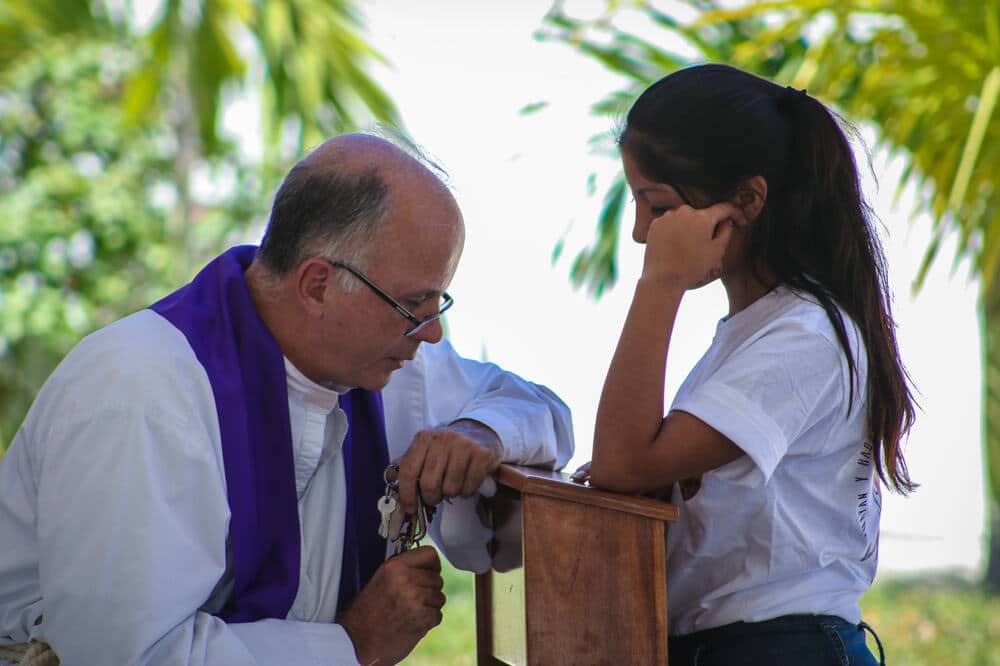An examination of conscience is a process of introspection and personal reflection that allows believers to deeply evaluate their actions, thoughts, and omissions in light of God’s commandments and the teachings of the Catholic Church. This spiritual exercise is essential to properly prepare for the sacrament of confession, as it helps to identify the sins committed and to recognize the areas of life that need amendment.
To conduct an effective examination of conscience, it is necessary to seek a quiet environment and dedicate time to reflection. This process involves reviewing the 10 Commandments, Jesus’ teachings, and Church guidelines, sincerely questioning whether one has lived according to them. Questions such as “Have I put God first in my life?”, “Have I been honest and fair in my relationships with others?”, and “Have I avoided situations that lead to sin?” are fundamental in this self-analysis.
Additionally, an examination of conscience invites believers to reflect on their interpersonal relationships, their participation in community life, and their commitment to Christian values. It is a time to recognize not only sins of commission (negative actions performed), but also sins of omission (good actions that were not done).
The examination of conscience should be a regular practice in the believer’s life, not only before confession, but also as part of their daily spiritual life. This habit of continuous self-evaluation helps to remain aware of one’s weaknesses and strengths, fostering constant growth in faith and virtue. In addition, it enables the faithful to live in a way that is more conscious and aligned with Christian values, promoting a more intimate and sincere relationship with God.
Examination of Conscience Based on the 10 Commandments:
1. You shall love God above all things
“You shall love the Lord your God with all your heart and with all your soul and with all your mind. This is the greatest and first commandment!”
(Mt 22:38-39)
- Do I believe in God? Do I bear witness to Him? Do I have firm and complete faith and trust in Him?
- Do I doubt or reject as true what God has revealed in the Scriptures (The Holy Bible)?
- Have I despaired, doubting God’s goodness, His justice, His promises, and His mercy?
- Have I presumed that God will save me anyway, even without conversion and without merit?
- Have I been indifferent, despising God’s action and strength in my life?
- Have I responded to God’s love with lukewarmness?
- Have I cultivated an unhealthy self-pride that has led me to hate God?
- Have I dedicated enough time to God in personal and communal prayer?
- Have I done things that require sacrifice – with true love – and offered them to the Lord?
- Have I fulfilled, in whole or in part, any promise made to God or His Church?
- Have I been superstitious, that is, have I attributed a somewhat magical importance to certain legitimate or necessary practices?
- Have I believed in and/or consulted and/or used: superstitions, sorcery, witchcraft, magic (even white magic), fortune-tellers, palmistry, mediums, omens, horoscopes, tarot cards, ‘chocolate cup readings’ and similar things; as well as cleansings, incense, talismans, ‘aloe vera leaves’, potions, spells, sorcery, Kabbalah, tarot, ‘astrological charts’, alchemy, Ouija boards, Santeria, amulets, and voodoo, gurus, shamanism, numerology, spiritism, ‘I am’, necromancy, crystals, stones, mantras, etc., and all kinds of ‘objects with power’? (Dt 18:10-12; Jer 29:8).
- Have I honored and/or revered and/or worshipped a creature (whatever it may be) instead of God? Such as money, power (or the powerful), pleasure, or material things (like cars and possessions that are placed above everything, even God).
- Have I put faith in, practiced, or been carried away by groups, sects, or movements that are not Christian or that mix the truth of Jesus Christ with other ideologies that contain truths, but some lies very disguised by the devil? For example: Mental power, reincarnation, false metaphysics, Silva method, occultism, spiritism, astrology, tarot, transcendental meditation, yoga, Gnosticism, I-Ching, ‘astral travel’, gurus, Inside, Advance, Dianetics, parapsychology, sophrology; dowsing, homeopathy, acupuncture and acupressure when accompanied by esoteric practices. Also hypnosis and self-hypnosis, regressions, aura reading, aroma therapy and flower essences, esotericism, theosophy, Freemasonry, Rosicrucianism, Buddhism, Hare Krishna, ‘spirit channeling or channeling’, Tao, Feng Shui and everything related to the ‘New Age’. Likewise, Mormons and Jehovah’s Witnesses who do not believe in Jesus Christ as the Son of God are non-Christian movements or sects (2Tim 4:3-4; 1Tim 4:1).
- Have I tempted God, that is, have I put Him to the test, doubting His word, or His work, or His goodness, or His omnipotence, or His love or power?
- Have I committed sacrilege? That is, have I profaned or unworthily treated the sacraments and other liturgical actions, as well as persons (priests and religious), things and places consecrated to God?
- Have I treated the Eucharist sacrilegiously?
- Have I bought or sold blessed religious items?
- Have I been an atheist, or a practical materialist (agnostic), have I rejected or denied the existence of God?
- Have I prayed very little or almost nothing, forgetting to offer the Almighty my loving work and to give thanks in prayer when I wake up, when I go to bed, and when I receive food?
- Have I approached unworthily to receive any sacrament?
2. You shall not take the name of God in vain
‘You shall not take the name of the Lord your God in vain.’
(Ex 20:7; Dt 5:11; Lv 19:12)
-
Have I used the name of God for things other than Praising, Blessing, and Glorifying Him?
-
Have I abused the name of God, that is, have I used inappropriately the name of God, or of Jesus Christ, or of the Blessed Virgin Mary, or of any Saint?
-
Have I made promises to other people in the name of God, compromising divine honor, fidelity, truthfulness, and authority? Have I been unfaithful to those promises?
-
Have I blasphemed; that is, have I uttered words of hatred, reproach, or defiance against God – internally or externally? Have I insulted God, disrespecting Him in my expressions?
-
Have I sworn falsely, unnecessarily, imprudently, or for things of little importance?
-
Have I perjured myself, that is, have I made a promise that I have no intention of keeping?
-
Have I sworn to do something evil? Have I tried to repair any damage that may have resulted?
3. Keep Holy the Sabbath
“Remember the Sabbath [Sunday] to keep it holy. Six days you shall labor and do all your work, but the seventh day is a day of rest for the Lord, your God. You shall do no work.”
(Ex 20:8-10; Dt 5:12-15)
-
Have I worked or made others work without urgent necessity on a day of obligation?
-
Have I used my time on the day of obligation in indecorous activities or others different from family sharing and spiritual growth? (Study of Sacred Scriptures, reflection, meditation, culture, etc., which favor the growth of interior, family, and Christian life).
-
Have I deliberately missed the Eucharistic celebration (Holy Mass) on any Sunday or holy day?
-
Have I voluntarily distracted myself during the Eucharist, and/or have I attended physically, but with my ‘heart and mind elsewhere’?
-
Have I observed abstinence on Fridays during Lent? Have I fasted on Ash Wednesday and Good Friday?
-
Have I confessed at least once a year? Have I done penance and fasted for my sins?
-
Have I kept the fasting disposition for one hour before the moment of receiving Communion?
-
Have I confessed as soon as possible after committing a mortal sin?
-
Have I helped the Church in its needs, to the extent that I can?
4. Honor Your Father and Mother
“Honor your father and your mother,” this is the first commandment that comes with a promise: “that you may be happy and have a long life on earth.”
(Eph 6:1-3; Dt 5:16)
Examination as Children
- Have I disrespected my parents? Have I had sincere attitudes of gratitude and love for them?
- Have I disobeyed my parents or superiors in important matters?
- Have I had an inordinate desire for independence, which leads me to receive my parents’ instructions poorly, simply because they command it? Do I realize that this reaction is caused by pride?
- Have I threatened or mistreated them verbally or physically, or wished them any serious or minor harm?
- Have I failed to help my parents in their spiritual or material needs, when I could have done so with effort?
- Do I get angry and fight with my siblings and companions? Have I stopped speaking to them, and not taken the necessary steps for reconciliation?
- Have I set a bad example for my siblings or companions; and have I been selfish or envious, always wanting to stand out, be right, etc.?
- Do I let myself be carried away by bad temper and get angry frequently without justified reason?
- Have I felt responsible to my parents for the effort they make for my education, studying intensely, and fulfilling everything at the educational institution?
- Do I respect all authority to which I am subject, and do I look at these superiors as representatives of God who has instituted them as ministers of His gifts? (Rom 13:1-2).
Examination as Parents
- Have I degraded conjugal love to a simple and irresponsible procreation of children, without caring or doing anything for the moral education and spiritual formation of these procreated beings?
- Have I set a bad example for my children by not fulfilling my religious, family, or professional duties?
- Have I corrected my children always with firmness, justice, and love, for their own good?
- Have I fulfilled the responsibility of evangelizing my children from an early age, teaching them the mysteries of faith, through the witness of Christian life according to the Gospel?
- Have I warned and instructed my children about bad company, teaching them about the dangers?
- Have I forced them to receive any sacrament without proper preparation?
- Have I prevented my children from following the profession or vocation that God indicates and desires for them; have I put obstacles in their way or deliberately given them bad advice?
- Do I allow them to study or work in places where their soul or body is in danger?
- Have I tolerated scandals or moral or physical dangers among the people living in my house?
- Do I try to befriend my children? Do I explain to them the origin of life, adapting to their mentality and capacity for understanding?
- In the family, do I get angry easily, and lack the kindness I express to strangers?
- Have I quarreled with my spouse? Have there been verbal or physical mistreatment?
- Have I partially or totally abandoned my spouse and/or my children or parents?
- Have I failed to help with the spiritual or material needs of the people around me, when I could do so – even with effort?
- Have I tried to earn enough, and not waste it, to be able to support my family with dignity?
- Have I chosen an educational establishment where we are WELL assisted in the task of giving our child(ren) a Christian education?
- At work or in other activities, have I ordered or established things contrary to the dignity of people and natural law?
5. You shall not kill
‘You have heard that it was said to those of old, ‘You shall not murder; and whoever murders will be liable to judgment.’ But I say to you that everyone who is angry with his brother will be liable to judgment.’
(Matthew 5:21-22)
-
Human life is sacred. Have I killed? Have I attributed to myself the right to directly and willfully kill a human being, whoever they may be?
-
Have I done anything to anyone with the intention of indirectly causing their death?
-
Have I denied assistance to any person in a state of danger?
-
Have I come to hurt someone? Have I driven any vehicle irresponsibly, putting my life and that of my companions at risk?
-
Have I indirectly participated with prior knowledge in any act where a person is murdered, and have I not put my full effort into preventing it?
-
Have I participated directly or indirectly in any provoked abortion? (Jeremiah 1:5). (This incurs excommunication ipso facto reserved to the Bishop; that is, it is a way the Church expresses the gravity of this crime).
-
Have I practiced euthanasia, that is, have I ended the life of disabled, sick, or dying people, or have I consented to or helped in this by action or omission?
-
We are stewards and not owners of the life God has entrusted to us… Have I attempted suicide? Have I voluntarily collaborated in someone’s suicide?
-
Scandal is the attitude or behavior that induces another to do evil. The one who scandalizes becomes a tempter of his neighbor; and can cause their spiritual death… By action or omission… Have I scandalized anyone by dragging them into a serious fault, that is, making them sin?
-
Do I consider my body as an ‘absolute value,’ sacrificing everything to it, or have I come to idolize physical perfection and sports success in a relative ‘cult of the body’?
-
Have I abused food, alcohol or liquors, tobacco or cigarettes, or medicines?
-
Have I used drugs or hallucinogenic substances? Have I produced, trafficked, or dealt in substances that incite serious practices contrary to moral law?
-
Have I used subliminal messages to dominate people’s will?
-
Have I endangered my mental and spiritual health by wanting to distract myself with music that contains subliminal messages that incite practices of violence, rebellion, and others contrary to the true love that Jesus Christ invites us to practice?
-
Have I participated directly or indirectly in kidnappings, acts of terrorism, or torture?
-
Have I participated in forced amputations, mutilations, or sterilizations of innocent people?
-
Have I helped the dying to remain dignified in their last moments, accompanying them in prayer, and ensuring they receive the sacraments in time?
-
Do I have in my heart a desire for revenge for the harm done to me? (Matthew 5:22).
-
Do I feel hatred, resentment, or bitterness towards anyone; have I wished them harm? Do I want to heal from these feelings? (Mt 5:44-45)
-
Have I avoided all conflict, fights, or wars, to the best of my abilities?
6. You Shall Not Commit Impure Acts
“You have heard that it was said, ‘You shall not commit adultery.’ But I say to you that everyone who looks at a woman with lust has already committed adultery with her in his heart.”
(Mt 5:27-28)
- Have I allowed myself to be dominated by passions? (To control passions, one needs, first of all, God’s grace, and a repeated effort throughout all stages of life. It also requires obedience to divine commandments, the practice of moral virtues, and especially, faithfulness in prayer)
- Have I failed in chastity due to lust? (disordered desire or enjoyment of sexual pleasure) Through masturbation? Through pornography? (actors, merchants, public)
- Have I misused technological advancements like the Internet for impure chats and actions that lead to the vice of lust? Have I realized that through the misuse of these means, I cause others to sin?
- Have I fornicated? (Sexual act between a man and woman not bound in sacramental marriage)
- Have I defiled my body through prostitution? Selling or buying pleasure? Do I facilitate or do business with prostitution?
- Have I forced or violently assaulted a person’s sexual intimacy (including a spouse)? Have I committed incest? (Sexual relationship or violation committed by parents or educators with children in their care) Have I committed ‘pedophilia’? (Sexual relationship with children)
- Have I had homosexual carnal relations? (Rm 1:24-27; 1Co 6:10; 1Tim 1:10; Gn 19:1-29)
- If I have instinctive homosexual tendencies… Have I united my difficulties in prayer to the sacrifice of Christ’s cross, always seeking to practice chastity through self-control, and aided by sacramental grace in the constant practice of communion and other sacraments?
Examination for Spouses
-
Have I been completely faithful in my marriage? (Mt 5:32; 19:6; Mk 10:11; 1Co 6:9-10; 1Co 6:9-10; Hos 2:7)
-
Have I broken the free marital contract through divorce? (Mk 10:9)
-
Have I lived in polygamy? Have I ended those illicit conjugal relationships? Am I fulfilling the duties contracted with that woman (those women) and the children?
-
Have I had carnal relations committing serious incest? (1 Co 5:1, 4-5; Lv 18:7-20)
-
Have I lived in a free union? Or have I lived in concubinage or in a trial union?
-
I don’t have children, and have I avoided fertility in my marriage?
-
Have I used contraceptive methods different from those requiring periodic continence (stopping sexual relations for a few days) and self-observation; thus allowing the use of infertile periods? (contrary are, for example: condoms, pills, foams, ovules, injections, and all types of anti-ovulatory drugs, etc.)
-
Have I used or promoted micro-abortive contraceptive methods that force the already fertilized fetus out of the uterus from the fallopian tubes? (for example: the ‘T’, the ‘S’, and other physical objects inserted into the uterus)
-
Have I used reprehensible techniques of artificial fertilization or direct sterilization? (tubal ligation, vasectomy)
-
Have I practiced onanism? or coitus interruptus? (see Genesis 38:9-10)
7. You Shall Not Steal
“You shall not steal”
(Ex 20:15; Dt 5:19)
-
Have I taken, retained, or unjustly seized any property belonging to others, against the reasonable will of its owner?
-
Have I defrauded, deceived, or cheated anyone in any business or commercial activity?
-
Have I paid unfair wages that are not in accordance with the person’s performance?
-
Have I raised the prices of my goods, speculating on others’ ignorance or needs?
-
Have I participated in any way in corruption, through which one tries to change the correct procedure for one that is more convenient?
-
Have I worked poorly? Have I stolen time at my job? Have I defrauded my employers?
-
Have I physically defrauded the State of fair and reasonable taxes that are reinvested for the benefit of the community? (See commutative justice and distributive justice 2409 – 2413 of the new Catechism of the Catholic Church)
-
Have I forged documents or used deceptive acts?
-
Have I squandered my assets or those I have been in charge of? Have I spent excessively or on luxurious things, seeking excessive pleasure or prestige?
-
Have I caused damage to public or private property or goods?
-
Have I failed to fulfill morally just promises or contracts? Have I failed without just cause in commercial contracts, purchase or sale, lease or work agreements, etc.?
-
Have I gambled unfairly, or cheated in games of chance, causing harm?
-
Have I invested very large sums of money in pets that could better help remedy human misery?
-
Have I made any animal suffer needlessly? Have I sacrificed the life of an animal without necessity?
-
In my work, have I placed personal profit as the exclusive standard and sole purpose of my economic activity; forgetting the fundamental rights of my workers or colleagues, and forgetting to perform my work as a service to others? “You cannot serve both God and money” (Mt 6:24; Lk 16:13).
-
Have I helped the poor with love? Have I practiced works of mercy and charity?
8. You shall not bear false witness or lie
“You shall not bear false witness against your neighbor”
(Ex 20:16)
-
Have I told lies? Have I told lies with the intention to deceive? (Eph 4:25)
-
Have I given false testimony publicly? (Pr 19:9)
-
Have I committed “perjury,” that is, have I said things contrary to the truth under oath?
-
Have I damaged someone’s reputation with unjust attitudes or words?
-
Have I judged a moral defect of my neighbor, even tacitly, without having sufficient grounds for making such a judgment?
-
Have I committed “slander,” that is, without objectively valid reason, have I revealed the defects and faults of others to people who did not know about these defects? (Sir 21:28)
-
Have I slandered, using words contrary to the truth, damaging the reputation of others?
-
Have I flattered or adulted another person in the malice of their evil acts, and in the perversity of their conduct, making myself an accomplice to vices and grave sins?
-
Have I failed against the truth out of vanity or boasting; or out of irony?
-
Have I failed by revealing professional secrets? Or by not keeping confidences made in secret? (Sir 22:22)
-
Have I listened to conversations against the will of those having them? Have I opened or read correspondence or other writings against the will of their owners?
-
Have I spoken ill of others under the pretext that I was told or that it is said out there?
9. You shall not consent to impure thoughts or desires
“You shall not covet your neighbor’s house; you shall not covet your neighbor’s wife,
nor his male servant, nor his female servant, nor his ox, nor his donkey, nor anything that is your neighbor’s.”(Ex 20:17)
-
Have I abhorred the concupiscence of the flesh, that is, have I rejected that sensual desire or appetite of the flesh that fights against the spirit? (Gal 5:16-17, 24; Eph 2:3)
-
Have I prayed to obtain from God the grace of purity and cleanliness of heart?
-
Have I struggled for purity of external and internal gaze (imagination); by rejecting all complacency in impure thoughts? “The sight stirs up the passion of fools” (Wis 15:5)
-
Have I failed against the modesty of the body, which is modesty and discretion; as well as against the modesty of feelings?
-
Have I let myself be carried away by the pressures of fashion, publicly wearing clothes or garments that sexually excite people of the opposite sex, and cause indecorous looks, desires and/or thoughts?
-
Have I participated in any way in pornography, or in exhibitionist acts or shows?
-
Have I misused the Internet, television, or other media for chats or “distractions” that lead to impure desires, thoughts, and/or acts?
-
Have I disrespected and/or offended the modesty of children or adolescents?
10. You Shall Not Covet Your Neighbor’s Goods
“You shall not covet anything that belongs to your neighbor.”
(Ex 20:17)
-
Have I coveted or unhealthily desired the goods of others?
-
Have I fallen into greed, that is, the immoderate passion for material wealth and power over it? “The eye of the greedy person is not satisfied with his lot” (Sir 14:9)
-
Have I felt envy, that is, have I felt “sadness” at the good fortune or success of others, and an inordinate desire to possess or obtain the same, even if improperly?
-
Have I wished serious harm to my neighbor?
-
Have I been too attached to earthly things (money, vehicles, houses, land, computers, etc.) and do I spend almost all my time accumulating these “material things”?
I Confess To Almighty God Prayer
I confess to Almighty God, and to you, my brothers and sisters, that I have greatly sinned in my thoughts and in my words, in what I have done and in what I have failed to do.
Through my fault, through my fault, through my most grievous fault.
Therefore I ask Blessed Mary ever-Virgin, all the Angels and Saints, and you, my brothers and sisters, to pray for me to the Lord our God.Amen
If you seek to deepen your spiritual life, this examination of conscience based on the 10 Commandments is an excellent tool to reflect on your actions and draw closer to God. This exercise will help you grow in your faith and improve in your Christian journey.
Use the Mass Times app to find confession schedules at a nearby church to attend today! Download it now.
If while reading this examination of conscience you feel the desire to approach God, don’t put it off. Confession is a precious opportunity to free yourself from the weight of sin and start anew with a clean heart. I recommend reading our article on how to make a good confession, where we guide you step by step so you can experience this sacrament with peace and confidence. Don’t be afraid! God awaits you with open arms. Why not confess this week?
What are the sins to confess?
The sins to confess are mortal sins, which gravely separate us from God. They must be confessed completely and clearly. Venial sins can also be confessed, although they are not mandatory for the sacrament’s validity, and their confession helps to receive additional grace.
What are the questions for the examination of conscience?
The examination of conscience is a deep reflection on our actions and omissions according to God’s commandments. Some key questions include: Have I put God first? Have I been honest with others? Have I avoided sin and bad influences in my life?
What should one say when confessing?
When confessing, the penitent must declare all mortal sins clearly and sincerely without omitting anything. They can also confess venial sins to receive more grace. After the confession, the priest imposes a penance and grants sacramental absolution, which restores the relationship with God.
What are the 5 steps for a good confession?
The 5 essential steps for a good confession are: making a sincere examination of conscience, having true repentance, resolving not to sin again, confessing all sins and receiving absolution from the priest, and fulfilling the imposed penance. These steps ensure an effective reconciliation with God and the Church.











